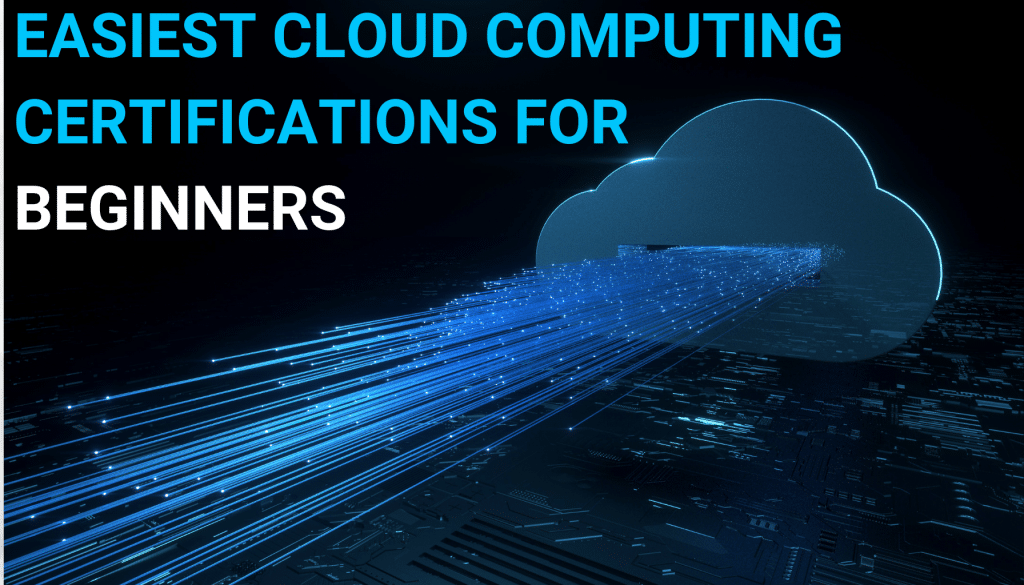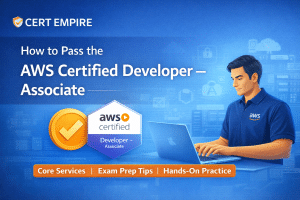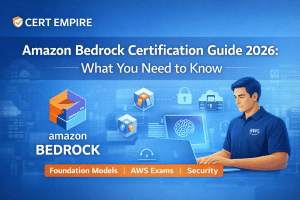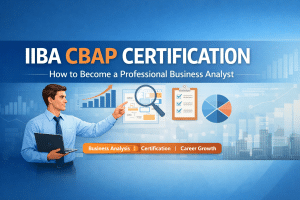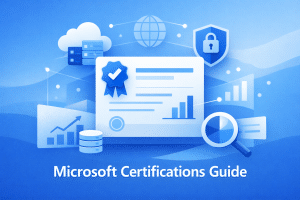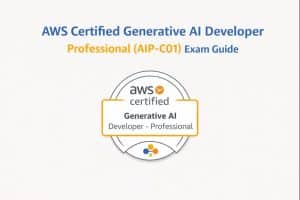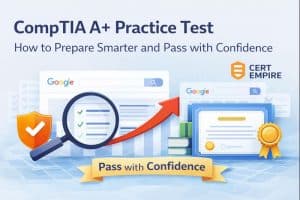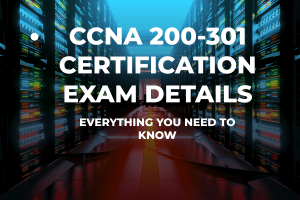Cloud computing is the backbone of modern technology, transforming how businesses operate and individuals work. Think about how we store files, manage data, or run applications – it’s all happening in the cloud. Over the last few years, the demand for cloud computing has exploded, and it’s no surprise.
As more companies move their operations to the cloud, the need for skilled professionals in this field is growing unprecedentedly.
The thing is, while the demand is there, companies need more than just an enthusiasm for tech – they need professionals who are trained and certified. This is where cloud certs come into play.
Starting Simple: 4 Easiest Cloud Certs for Beginners
Cloud computing certifications provide a gentle introduction to cloud technology, offering a clear and structured path to understanding its basics.
With a manageable learning curve, these beginner-friendly certs allow you to build a solid foundation and gain confidence as you move forward in your cloud computing journey.
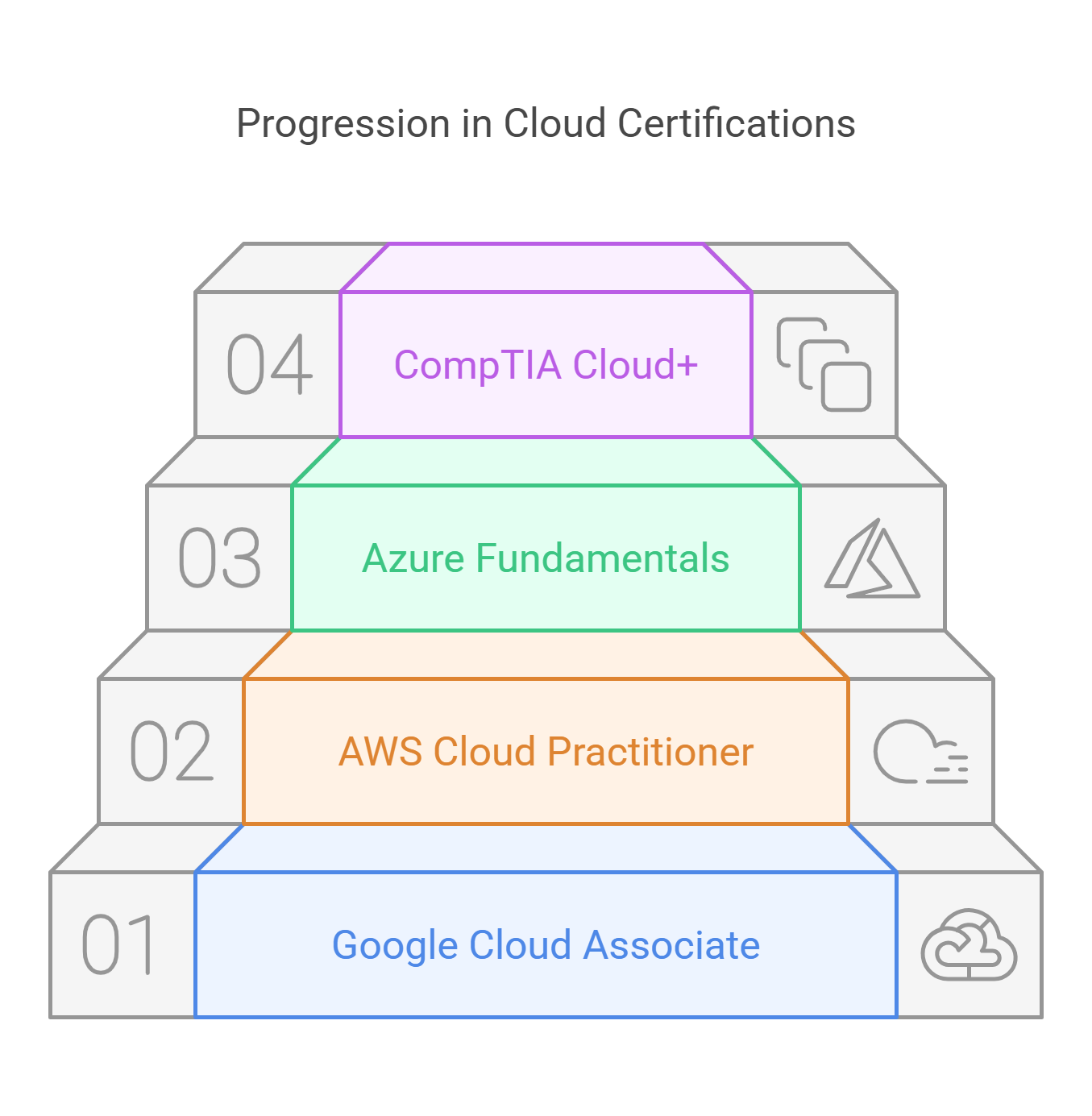
1- Google Cloud Certified – Associate Cloud Engineer: A Gateway to Cloud Careers
The Google Cloud Certified – Associate Cloud Engineer certification is an excellent starting point for beginners looking to enter the world of cloud computing. It’s specifically designed for people new to the Google Cloud platform who want to gain practical, hands-on experience.
Why It’s Ideal for Beginners
This cert is beginner-friendly because it focuses on foundational cloud skills without delving into complex, advanced topics.
You will learn the basics of cloud computing professionals setting up and configuring cloud environments, deploying applications, managing cloud resources, and monitoring performance. These are the kinds of tasks that every cloud engineer must be able to perform.
The simplicity of the Associate Cloud Engineer certification lies in its approach: it’s all about practicality. Rather than focusing heavily on abstract concepts, it guides you through the essential tasks you need to understand to get started with Google Cloud.
What It Covers
- Setting up cloud environments in Google Cloud
- Deploying and managing applications
- Monitoring cloud performance
- Managing resources and troubleshooting issues
If you’re new to cloud computing and want to work with Google Cloud, this certification provides the hands-on experience needed to start confidently. This is where cloud certs come into play. If you’re planning to upskill this year, here’s a complete guide on the Best Cloud Certifications in 2026 to help you choose the right path.
2- AWS Certified Cloud Practitioner CLF-C02: A Solid First Step Into Cloud
Another excellent option for beginners is the AWS Certified Cloud Practitioner certification.
This foundational certification gives you a broad understanding of AWS cloud services widely used across various industries.
Why It’s Perfect for Beginners
The AWS Certified Cloud Practitioner is specifically designed to be simple and accessible. You don’t need deep technical knowledge or experience with cloud computing to pass the exam.
The focus is on giving you a general understanding of AWS services, terminology, and basic cloud concepts.
What It Covers
- Core AWS services and their use cases
- AWS cloud architecture and security
- Cloud deployment models and pricing
- Basic cloud computing concepts and terminology
This certification is a great starting point if you want to get a feel for AWS and its ecosystem. For a detailed breakdown of the exam structure, key topics, and best study tips, check out AWS Cloud Practitioner CLF-C02 Cert Guide.
3- Microsoft Certified: Azure Fundamentals AZ-900 – Ideal for Newcomers
The Microsoft Certified: Azure Fundamentals certification is another beginner-friendly option for those interested in cloud computing.
As one of the most widely used cloud platforms, Microsoft Azure offers a comprehensive introduction to cloud technology.
Why It’s Beginner-Friendly
This certification is designed with newcomers in mind. It covers fundamental cloud concepts and introduces the basics of Microsoft Azure. Whether you’re new to IT or already have some experience google cloud technologies, this cert helps build a solid foundation in Azure’s core services.
What It Covers
- Core cloud concepts and services in Azure
- Azure pricing, SLA, and lifecycle
- Azure governance and compliance
- Azure cloud solutions and architecture
The Azure Fundamentals certification is ideal for anyone exploring Microsoft’s cloud offerings and understanding how they work. Want to dive deeper into AZ-900? Read this complete Guide on AZ-900 Certification If you’re interested in Azure or have plans to work with this platform, this cert is a solid first step.
4- CompTIA Cloud+ CV0-004 – The Simple, Broad Certification for IT Beginners
. This certification provides a broader perspective on cloud technologies and covers multiple platforms, giving you a well-rounded understanding of cloud computing.
Why It’s Great for IT Beginners
CompTIA Cloud+ is perfect for IT professionals who want a comprehensive understanding of cloud computing, regardless of the specific platform.
It focuses on cloud infrastructure, deployment models, and virtualization, making it an excellent choice for anyone exploring the cloud without being locked into a single vendor’s ecosystem.
What It Covers
- Cloud architecture and design
- Cloud deployment models and infrastructure management
- Virtualization and cloud security
- Resource management and disaster recovery
CompTIA Cloud+ provides a solid starting point for IT beginners, covering the foundational cloud concepts that will serve as a stepping stone to more specialized certs. CompTIA Cloud+ provides a solid starting point for IT beginners. While beginner-friendly, some learners may find it more demanding compared to others. You can see how it stacks up against the Hardest Cloud Certifications currently available.
Key Benefits of Earning Easy Cloud Certs
When starting in cloud computing, easy cloud certifications seem like a stepping stone, but they come with some pretty solid benefits beyond simply checking a box on your resume.
1- Boosting Job Prospects
Companies are increasingly looking for candidates who understand cloud computing. The demand for cloud skills is growing across all industries, from healthcare to finance to entertainment.
Even entry-level positions are starting to require cloud knowledge. Earning a beginner cloud cert signals to potential employers that you’re ready to dive into cloud-related work. It shows you have the foundational knowledge to contribute to cloud projects and understand how cloud environments work.
How much does earning a cert help? In many cases, cloud certifications are becoming almost as important as a degree. Employers are more likely to hire someone with a cert because it proves you have practical, up-to-date skills.
Plus, even if you don’t land a cloud-focused job right away, having one of these certs on your resume opens doors to IT and tech roles where cloud skills are essential. It helps you stand out in a crowded job market.
Employers are more likely to hire someone with a cert because it proves you have practical, up-to-date skills. Plus, cloud professionals often earn significantly more. Check out our report on the Highest Paying Cloud Jobs in 2026 to see the salary potential.
2- Gaining Foundational Knowledge
One of the biggest advantages of these easy cloud certifications is the solid foundation they provide. Think of it like laying the first brick in a building.
You need to understand the basics before moving on to more complex topics. The knowledge gained from these beginner certs will give you a good grasp of cloud computing concepts like cloud services, storage, virtualization, and security.
You don’t have to dive into deep technicalities immediately, but the certs give you a roadmap of where your knowledge should grow.
Whether it’s Google Cloud, AWS, or Microsoft Azure, each cloud provider has its unique structure. However, all cloud services share common concepts, such as virtual machines, cloud storage, and networking.
Getting certified early will teach you these core concepts across different platforms. This foundation helps you build a broader understanding of how clouds operate.
3- Expanding Your Resume
Let’s face it: everyone wants something that makes them stand out.
Easy cloud certs offer just that, a quick, efficient way to add value to your resume. They show that you’ve invested time in learning a new skill and demonstrate your commitment to keeping up with current tech trends.
Plus, earning these beginner certs doesn’t require months of study. They are designed to be manageable and won’t overwhelm you with heavy workloads. This makes them an ideal way to expand your resume without overburdening yourself with too much information at once.
To future-proof your career, stay updated with the Future Trends in Cloud Computing shaping certifications in the coming years.
4- Building Confidence in Cloud Computing
Studying for and earning a cloud cert helps you become more comfortable with cloud technologies. Even if you’re entirely new to IT or cloud computing, working through the study materials for these entry-level certs gives you the confidence to tackle cloud-related tasks in the real world.
As you learn and grasp the basics, you’ll feel more comfortable discussing cloud concepts, which is a huge confidence booster when applying for jobs or working in tech teams.
This confidence doesn’t just help you with certifications; it’s also key when working with clients, employers, or team members.
Being able to confidently discuss the cloud’s role in your company’s operations or explain how different cloud services work is a skill that only grows with experience, and these easy certs lay the groundwork.
5- Gaining Practical, Hands-On Skills
While studying for certifications might seem like all theory, many beginner cloud certs incorporate practical, hands-on labs that allow you to apply what you’re learning in real-time. For example, the Google Cloud Associate Engineer cert or AWS Cloud Practitioner cert lets you dive into actual cloud environments and configure resources, manage services, and deploy applications.
These hands-on experiences reinforce your learning and give you the experience you can directly apply in a work setting.
How do you choose the right cloud cert for you?
Choosing the right cloud cert is crucial for your career.
With some thought and planning, you can find a certification that works for you and sets you up for success. Here’s how to make that decision.
Know Your Career Goals
Start by thinking about where you want your career to go. Suppose you’re just starting and want a broad understanding of google cloud platform GCP. In that case, you might want to begin with a cert that covers the basics of cloud tech, like the AWS Certified Cloud Practitioner or Microsoft’s core Azure services.
These give you a solid foundation to build without immediately getting into anything too complicated.
If you are aiming for a specific career, like cloud engineering or cloud architecture, you might want a cert that’s a bit more specialized. For example, Google’s Associate Cloud Engineer cert focuses specifically on cloud engineering, which could be the perfect fit if you’re aiming for that role.
On the other hand, if your goal is to go into a more business-focused role, like a cloud consultant or sales engineer, a vendor neutral certifications, like AWS’s Cloud Practitioner or Azure Fundamentals might be more relevant. They give a broad overview of the cloud services offered by those platforms.
Understand Your Learning Style
Not all of us learn the same way, so think about how you learn best. Suppose you’re a hands-on learner who thrives by diving straight into the tech. In that case, certifications like the Google Cloud Associate Cloud Engineer or Amazon web services AWS Associate might be your best bet.
These exams require a deeper dive into cloud platforms and give you practical, real-world tasks that will help you build on your skills.
Microsoft’s Azure Fundamentals might be better if you prefer learning by reading or following structured guides. It’s more theory-based and is designed to introduce you to the core concepts of cloud computing before diving into more technical stuff.
If you like a mix of theory and practical, then CompTIA Cloud+ might work well for you it offers a good balance of both.
Consider the Cloud Platform
Different cloud providers focus on different types of services and markets. Your chosen platform might depend on your interests or the industry you want to work in.
- AWS (Amazon Web Services) is the big player in the cloud space and has the largest market share. If you want to work as a certified cloud security professional, AWS certifications are a great choice. They cover everything from basic cloud concepts to complex architecture and deployment. AWS’s entry-level certs are particularly popular for those new to the cloud, and the AWS Cloud Practitioner is a great place to start.
- Microsoft Azure is highly popular in enterprise environments, particularly in organizations that already rely on Microsoft tools like Windows Server, SQL Server, and Active Directory. Azure might be the way to go if you plan to work in industries that use many Microsoft products. The Microsoft Certified: Azure Fundamentals cert is designed for beginners and is a great starting point.
- Google Cloud is making a big push in the cloud space, especially with organizations focused on data and machine learning. Google Cloud might be your best bet if you’re interested in working with cutting-edge data science, AI, and machine learning technology. The Google Cloud certifications are beginner-friendly and focuses on getting you comfortable with Google’s cloud services.
Think About Market Demand
Sometimes, it’s about going where the jobs are. Before you pick a cert, take a quick look at the job market in your area or the area you want to work in. Which cloud platforms are employers asking for?
For example, if you’re in a region where AWS is in high demand, start with an AWS cert. If Azure is more popular, begin with Microsoft.
The reality is that all three major cloud platforms (AWS, Azure, and Google Cloud) are in demand, but some regions or industries may favour one over the others. Look at job listings on LinkedIn or Indeed to see which certs employers seek in your desired field or location.
This can give you a clearer idea of which platform will set you up best for success.
Set a Realistic Timeline
Be honest about how much time you can commit to studying for a cert. Some beginner-level certs, like the AWS Cloud Practitioner or Azure Fundamentals, don’t require months of preparation. You can usually get ready in a few weeks if you dedicate a few hours daily.
But if you’re looking at something like the AWS Solutions Architect – Associate or Google Cloud Professional Cloud Architect, you’ll likely need more time and a deeper commitment.
Set realistic goals for how much time you can spend studying. If you have a busy schedule, picking a cert that doesn’t require heavy hands-on labs or deep technical knowledge may be better.
But if you have more time to dedicate to studying, a cert that’s a bit more in-depth could be a great challenge and give you a more specific skill set.
Tips to Prepare for Easy Cloud Certifications
So, you’ve decided to go after an easy cloud cert.. great choice! But even easy certs require preparation to pass. Luckily, getting ready for these entry-level cloud certifications doesn’t have to be overwhelming.
There are plenty of resources and strategies that can help you prepare efficiently. Here’s a straightforward guide to help you get there.
Set a Realistic Study Plan
The first thing to do is figure out how much time you have to study. Setting a study schedule that fits your lifestyle is key. If you’re working full-time, you might only have evenings or weekends to study.
Break your study time into manageable chunks. Aim for small, consistent study sessions rather than cramming them all at once.
For entry-level certs, you don’t need to study for months. A few weeks of focused study should be enough if you dedicate about an hour or two each day.
Make sure to take breaks to avoid burnout. Keep your goals simple—try to cover a set topic daily, and don’t stress if you don’t know everything immediately.
Use Online Courses to Your Advantage
The internet is full of excellent resources, and there’s no shortage of affordable or even free online courses that can guide you through the process. Platforms like Coursera, Udemy, LinkedIn Learning, or A Cloud Guru offer beginner-friendly cloud computing courses explicitly designed for entry-level certs.
These courses break down the material into bite-sized lessons you can follow at your own pace.
Focus on finding courses with a mix of video content and practice exams. This combo helps you understand the theory and lets you test your knowledge.
Also, some courses offer hands-on labs, which are crucial for learning to use cloud platforms like AWS, Azure, or Google Cloud.
Hands-On Practice is a Game-Changer
You can study all day, but cloud computing is one of those things you need to experience to understand fully. That’s why hands-on practice is essential.
AWS, Google Cloud, and Azure all offer free tiers or trials that let you explore their platforms without spending money.
For example, take advantage of the AWS Free Tier if you’re studying for AWS. Spend time setting up services, deploying resources, and configuring cloud infrastructure. The same goes for Azure and Google Cloud—both have free credits or free tiers that allow you to practice in a real cloud environment.
It’s not just about reading; it’s about clicking buttons and making things work. The more you practice, the more confident you’ll feel during exam day.
Study Groups and Peer Support
Studying doesn’t have to be a solo mission. Find a study group or a buddy to work with if you can. Being in a study group helps because you can ask questions, share resources, and even quiz each other.
Sometimes, just explaining things to others can solidify your understanding.
If you don’t have a local study group, consider joining online communities. Many Facebook groups, Reddit threads, and even Discord channels are dedicated to cloud certifications.
Jump in, ask questions, and learn from others. People in these groups are often happy to share tips and advice from their certification journeys.
Use Exam Dumps to Test Your Knowledge
ne great way to get ready for the exam is by using practice tests that simulate real exam conditions. Many candidates rely on Cert Empire for high-quality exam dumps that closely mirror actual test questions, helping them improve accuracy and time management. These practice exams provide insight into question formats, timing, and critical areas to focus on for better exam readiness.”
Stay Organized and Avoid Overwhelm
There’s a lot of information to absorb when preparing for a cloud cert, but staying organized can make it easier. Keep all your study materials in one place, whether digital or physical. Use Trello or Google Keep to track your progress and set study goals.
If you feel overwhelmed, step back and simplify. Stick to the basics, and don’t stress over advanced topics not covered in the certification exam.
Remember, these easy certs are designed for beginners, so focus on the core concepts first; don’t get lost in unnecessary details.
Take Regular Breaks and Stay Motivated
Studying for a cloud cert can be intense, but don’t forget to give yourself breaks. The Pomodoro Technique is a popular method where you work for 25 minutes and then take a 5-minute break.
After a few rounds, take a longer 15-30 minute break. This helps maintain focus without feeling drained.
Also, find ways to stay motivated throughout your study journey. Celebrate small wins, finishing a module or taking a practice exam.
Setting little rewards for yourself can help keep you on track and energized.
Conclusion!
Consistency, hands-on practice, and using the right resources will go a long way in helping you pass these beginner-level exams without too much stress.
Keep your approach simple, stay focused, and Remember!! Cloud computing is a skill that will open doors to plenty of exciting opportunities.
FAQs
What are the easiest cloud certifications for beginners?
The AWS Certified Cloud Practitioner, Google Cloud Certified – Associate Cloud Engineer, and Microsoft Certified: Azure Fundamentals are great options for beginners due to their foundational content.
Which cloud certification is best for beginners in 2026?
The AWS Certified Cloud Practitioner is considered one of the best for beginners in 2026 because of its broad overview of AWS services and cloud concepts.
How long does preparing for the AWS Certified Cloud Practitioner exam take?
It typically takes about 2 to 3 weeks to prepare for the AWS Certified Cloud Practitioner exam with consistent daily study.
Is the Microsoft Azure Fundamentals certification suitable for beginners?
The Microsoft Azure Fundamentals certification is beginner-friendly and covers essential Azure cloud services and concepts.
Can I learn cloud computing on my own before taking a certification exam?
You can learn cloud computing on your own using free resources like tutorials, videos, and cloud provider documentation.
Do I need prior IT experience to earn an entry-level cloud certification?
No, prior IT experience is not required for entry-level cloud computing security certifications; they are designed for those new to cloud computing.

